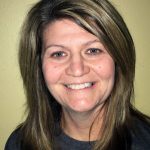Candidates discuss vouchers, guns, nepotism and more
By Scott Bellile
Four area residents are on the Tuesday, April 2, ballot for two seats on the New London School Board.
Two incumbents, Vice President Virginia Schlais and Chris Martinson, face competition from challengers Tina Ruckdashel and Pete Bosquez, who finished first and second respectively in a six-way primary last month.
Martinson and Schlais attended a candidate forum on March 19 hosted by the conservative Wolf River Area Patriots organization and answered audience members’ questions.
Bosquez and Ruckdashel did not attend, so the Press Star offered them the opportunity to respond to the same questions after the event. Here are the four candidates’ responses to six of the questions posed that night.
Candidate backgrounds

Pete Bosquez: “I lived in the area my whole life.” The Waupaca County Board member and retired sheriff’s deputy said he has dedicated most of his adulthood to serving the public, and he cares about his community.
Chris Martinson: A self-employed hardwood lumberman for 32 years, Martinson is married with two adult sons who attended New London schools. He describes himself as a traditionalist on social issues and “a watchdog of preserving Judeo-Christian values in our schools.”
Tina Ruckdashel: Ruckdashel is a lifelong New London resident excluding her college years. She is married with four children who have gone through the school district. She has worked in education for more than 25 years, primarily teaching early childhood but now working a managerial role for the Head Start program.

Virginia Schlais: In 1988 Schlais and her husband moved to New London where their four adult children attended private and public schools. She joined the school board in 1997 when her children were entering the public schools because she felt the district could offer higher-quality education.
Was the $13 million facilities referendum passed by voters in 2018 shy of what was needed, adequate or too much money? And are you fiscally conservative, moderate or progressive?
Bosquez: “Without having all of the exact numbers in front of me, from what I saw of the referendum I think it’s a good plan, and I think it achieves the goals that the board at the time was looking for.”
Martinson: Describing himself as fiscally conservative, Martinson thought $13 million was too high. He wanted it closer to $10 million with the district covering more project costs from its budget. He was involved in convincing the school board to pass a $13 million referendum instead of the original $15 million proposal.
Ruckdashel: Having not been involved in the referendum discussions, Ruckdashel declined to give a hard answer. “Should there have been a little bit more spending? Possibly, because now we’re not planning for the future.” She described herself as fiscally moderate.
Schlais: Schlais did not assign a label to her fiscal nature, saying her beliefs depend on where the numbers lie. She felt the referendum dollar amount could have been higher based on a consultant’s recommendations and the fact that property taxes still would have decreased this year under a $15 million referendum.
Should teachers carry guns?
Bosquez: Having served as a firearms instructor for the Waupaca County Sheriff’s Office for 17 years, Bosquez said it may be impossible for a teacher to flip their mindset from helping children to using deadly force. “Officers train hours and hours and hours every year to be able to keep that mindset they need going.” The school would be liable in an accident or misuse, he added.
Martinson: “I think we absolutely have to in this day and age because all the shootings are in places where guns aren’t allowed.” The police liaison officers cannot be everywhere at once, Martinson said.
Ruckdashel: “There’s a great deal of thought that needs to go into that decision, and I don’t think currently we’re there on talking about that to be put into place.” Ruckdashel questions whether a trained teacher would be mentally prepared to shoot an intruder and what liability issues might arise if the teacher did.
Schlais: “Yeah, I’m not really for teachers having guns in the classroom.” Schlais said the district has secured entrances, three police liaison officers and direct lines of communication to New London Police Department should a police presence be required.
What is your stance on vouchers for private, parochial and charter schools? Is school choice important to the community?
Bosquez: “Personally I believe it’s a good program. If you want to move your kid to a school that has the programs as a parent you feel are going to set them up for success, you should have the right or the ability to do that.”
Martinson: Vouchers create a little financial hardship on public school districts, but more importantly they empower parents to make education choices for their children, especially low-income families, Martinson said. “And I think it puts the pressure on us in the public school to do a good job so we don’t lose those students.”
Ruckdashel: “I think it’s always a personal decision where is the best place for your child, but when we’re talking about state funds and being fiscally responsible, we can’t do it all. We can’t always allow for everyone to get a piece of the pie, I guess, and if you’re not using basically the free education, then maybe the parent needs to stand behind their decision for something different for their child.”
Schlais: “I really want parents to have choice … and I want those parents in the low income to have more of an advantage to make the choice of where they want their kids to be, but I still think some of the financial parts of that still needs to be worked out a little better.”
How should schools handle restrooms and locker rooms for transgender students, and should transgender athletes compete against students of the sex they transitioned into?
Bosquez: Bosquez said he would be OK with special restroom accommodations for transgender students. As for transgender athletes, “There’s a genetic advantage there that should be taken into account.”
Martinson: To steer clear of potential lawsuits, “I think we should be having a policy that says your biological sex is what your sex is, and we should have strong consequences against bullying people who consider themselves transgender.” Martinson said he would be OK with separate restrooms for transgender students.
Ruckdashel: Of restroom rules, “I don’t think we should worry about it unless there is some law that tells us we have to do that.” She said she would need to hear the specifics of a transgender athlete’s case before deciding whom they compete against.
Schlais: Transgender students should be given private restrooms in order to protect the emotional well-being of the rest of their classmates, Schlais said. Transgender athletes should compete against students of the sex they were born as to keep the competition fair, Schlais said.
Would there be a conflict of interest if Tina Ruckdashel were to serve on the school board with her sister, board Clerk Connie Neely?
Bosquez: Bosquez did not see a problem. “I know them both and they’re both strong-minded individuals who vote the way they feel best without being unduly influenced.”
Martinson: “There’s no legal conflict on this. I have heard from the school board administration that that is not considered a strict conflict of interest to have that, so the voters have to decide.” That being said, Martinson said if his brother were serving on the school board, he would not run.
Ruckdashel: Ruckashel laughed at the question, then said she and Neely are close but they also have their own minds. “We can agree to disagree whenever that is necessary.” Feeling targeted by the question, she added that “certain members of our board” are working “to build alliances to get like-minded people elected whose views take us backward instead of moving forward.”
Schlais: “It is up to the community to decide that question.”
For further information on each candidate, read their responses to a questionnaire published prior to February’s primary.
